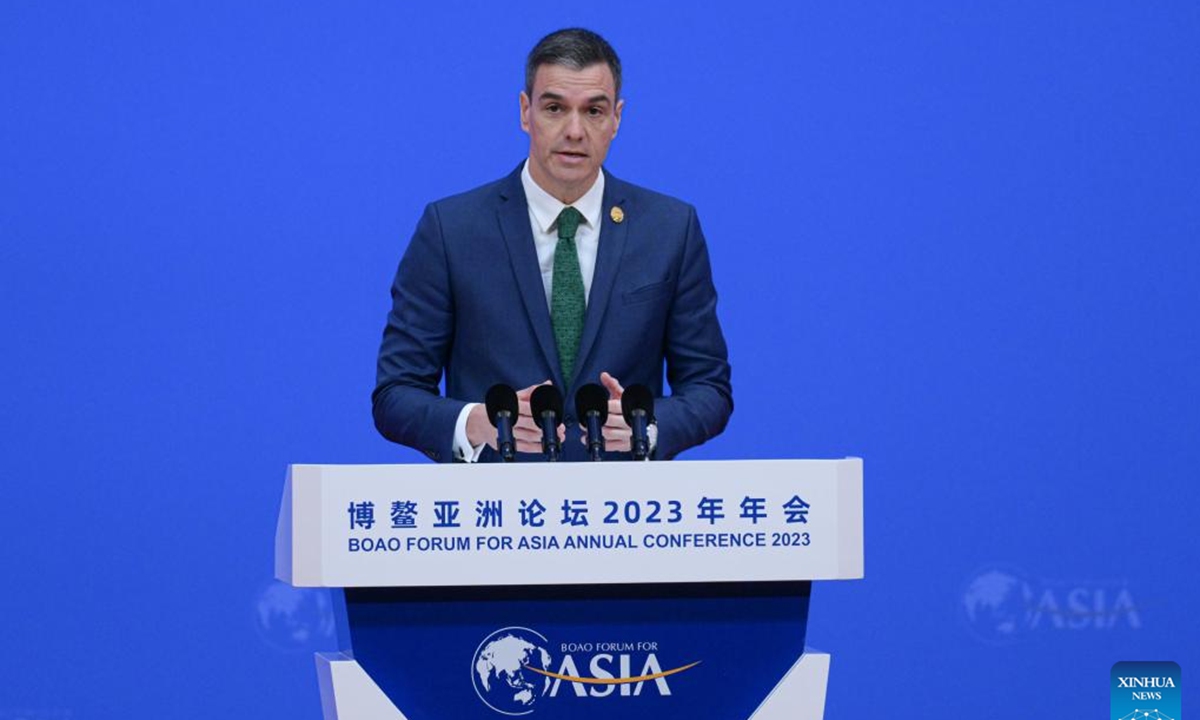
Spanish Prime Minister Pedro Sanchez delivers a speech at the opening ceremony of the Boao Forum for Asia Annual Conference 2023 in Boao, south China's Hainan Province, March 30, 2023. Photo:Xinhua
China has become a global power. With great power comes great responsibility. It is time for China to demonstrate its ability to accept such responsibility to third parties in order for its global influence to be welcomed. For example, when Riyadh and Tehran agreed to reestablish their diplomatic relations after a seven-year hiatus, China was willing to mediate a conflict and achieved the proposed objectives. But is it possible to mediate between Ukraine and Russia?
China is a rational, intelligent, and long-term planner. Therefore, to solve the conflict in Ukraine, China knows that cooperation with the other international actors, such as the EU, is a must. However, working with the EU is complex because it has a three-headed power structure, and 27 state members must agree on their policy's direction. Even though it sounds rather cumbersome, there is a way to get the wind to blow in only one direction in the EU's heart, and it is through the presidency of the Council of the EU.
Spain will hold the presidency of the Council of the EU during the second half of 2023, starting in July. During its presidency of the Council, Spain will be responsible for coordinating the work of the Council and leading negotiations between state members on key policy initiatives and legislative proposals and, besides, working with other member states to develop a common position on diplomatic issues.
Even though the EU continues to face challenges such as the COVID-19 pandemic, climate change, and geopolitical tensions, Spain's presidency will be affected primarily by the ongoing conflict between Russia and Ukraine. Given the gravity and complexity of the situation, this conflict will continue to be an essential issue on the EU's agenda during that period.
As the president of the Council of the EU, Spain has a crucial role in advancing the EU's response to the situation in Ukraine. Spanish Prime Minister Pedro Sanchez is paying an official trip to Beijing on March 30 and 31. Pedro Sanchez is the first Spanish prime minister who neither separated the national sphere from the international nor submitted the second to the first. On the contrary, thanks to professional experiences abroad during his youth, he has the knowledge and ability to play globally. It is also the first time that Spain will lead debate in Brussels and other international structures. Brussels listens to Sanchez, letting him promote the policy of European funds, the gas cap, open the EU to reform the energy market, and introduce a tax on large electricity companies.
Spain has an ambitious international agenda; "much is expected of our Presidency," acknowledged Pedro Sanchez. However, Pedro Sanchez's objectives are much more significant. It is an important electoral year for Spain, celebrating a double electoral process: May 28 are the municipal and regional elections. Then, in December, the national elections will take place.
Although international politics cannot win the elections, as well as French President Emmanuel Macron, who used the international stage as a campaign strategy to differentiate himself from the other candidates before the first round (April 2022), Pedro Sanchez is using a similar approach: he takes advantage of the national image (soft power) of Spain, and uses it as his own at the national level.
This week's meeting could strengthen the bonds of friendship between the two states and be mutually beneficial. Both China and Spain advocate multilateralism, cooperation, and the peaceful and diplomatic resolution of conflicts, and having the same objective for a different purpose, starting in July, Spain may become an indispensable partner for China on the European stage.
The author is policy analyst and Expert collaborator in Asia for the Vice presidency of International Relations of the Spanish National Research Council (CSIC). opinion@globaltimes.com.cn




